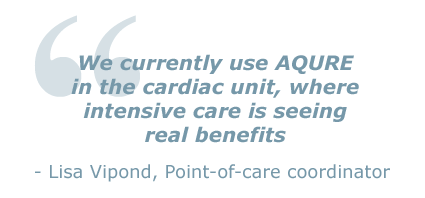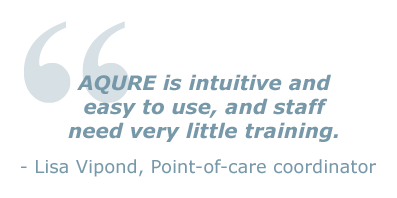Great Ormond Street Hospital (GOSH) recently invested in four Radiometer ABL90 FLEX blood gas analyzers, and simultaneously implemented the AQURE system, enabling POC testing to be monitored from a central location for optimised instrument uptime and ensuring quality of results.
Point-of-care coordinator Lisa Vipond explains: "The Cardiac Intensive Care Unit was relocating to a new, much larger unit that covered a wide area, and this coincided with a need to replace our existing analyzers. We wanted to install additional analyzers and, logistically, they had to have a smaller footprint than our old systems, which were very large.
We chose the ABL90 FLEX because it was the smallest analyzer on the market that could quickly and reliably perform the required panel of tests from one, small volume sample, which is very important in paediatric care.
At the same time, we invested in the AQURE POC data management system to enable direct transfer of results into the hospital’s Clinical Information System (CIS). As well as connecting to the ABL90 instruments, we use AQURE to manage the ABL825 analyzer in use in our theatres."
Results delivered directly to the patient's bedside
"We currently use AQURE in the cardiac unit, where intensive care is seeing real benefits. All the results from our theatres feed into the CIS before the child returns to the ward, providing clinicians with full details of the patient's condition.
Being able to see how the child's condition has changed and knowing what to expect help the clinicians to reduce unnecessary interventions, which is a great improvement.

We are also considering using barcoded syringes that can be read at the patient's bedside, as this would eliminate the need to manually input the hospital number, and the associated risk of operator error, providing full traceability."
Remote monitoring affords more flexibility
"Our previous system was PC-based, and could only be accessed by one person at a time. Integrating AQURE into our IT infrastructure has given us more flexibility, making control and monitoring of the analyzers, as well as management of operators and their ongoing competency, far easier.

Multiple operators can perform lots of different device actions – from any PC – without having to wait for the current user to log off, and the simple traffic light-based system provides a clear indication of each analyzer’s status; it’s either red, amber or green.
Almost everything can be done remotely, which helps us to plan any scheduled maintenance procedures; if we need to physically go to a system, we know what to expect when we arrive, which saves so much time. Ultimately, we have more control and a better overview of what is happening."
Inspection ready in an instant
"For accreditation purposes, we need to show that only approved operators have access to the analyzers. Previously, operators had to be added to each individual instrument, which was very time consuming.
With AQURE, granting the necessary user access rights is much quicker and easier. Operators are simply added to the database and the information is pushed to all the appropriate devices, with the user’s competency status displayed online.
AQURE also offers an open platform for e-learning. Staff are not always available to attend training sessions, and AQURE's e-learning facility provides extra flexibility, making it easier to demonstrate and maintain continuing competence; details of the required training module are emailed to the operator for them to complete at a time and place convenient to them.
An audit trail is also essential, and AQURE documents all activities and actions relating to POC blood gas testing, giving us a full audit history of everything that has happened on a particular analyzer.
AQURE is much easier to use than our old system; it is far more straightforward to monitor processes and extract information for reports, which was previously quite a time-consuming task. All our evidence is readily available, ensuring that we are always inspection ready."
Upgrade without disruption
"We have a very good relationship with Radiometer. The company is always there to help, and values feedback and suggestions for future enhancements to AQURE.
As we run the software on two virtual servers, we never lose our connection and have no downtime during an upgrade; the intensive care unit simply has to save its work, which has made the upgrades a lot smoother.
We can now see all the patient results remotely and no longer have to go into another system to view them, which is a real step forwards."

